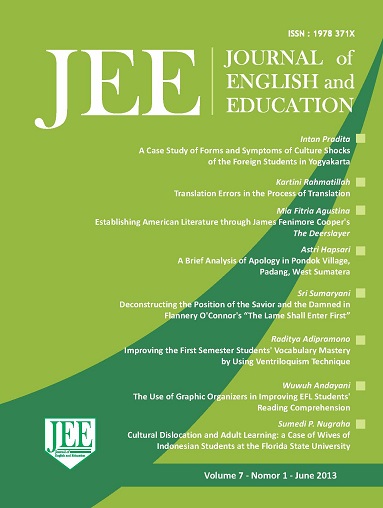Main Article Content
Abstract
This paper aims to show the use of deconstruction theory by Jacques Derrida to offer other possible meanings in a short story entitled “The Lame Shall Enter First” by Flannery O'Connor. The researcher shows the flaw in the binary oppositions constructed by the text and reveals the failure of the logical arguments of the oppositions by redefining qualities of the opposite characters in the story, Sheppard, Norton, and Rufus. The researcher used descriptive-qualitative method as it is a qualitative research of which the data are nonnumeric. The researcher finds three binary oppositions that become the center of the story. The first pair of binary opposition is religion and logic. The second are selfishness and compassion, and the third is ignorance and sympathy. The oppositions are represented by characters Sheppard, Rufus, and Norton. By closely reading the text and attacking the basic premises of the text, the researcher finds that the binary oppositions no longer serve as the foundation of the story since the story proves that all those binary oppositions eventually show otherwise.
Keywords: deconstruction, binary opposition, character
Article Details
Copyright (c) 2016 JEE, Journal of English and Education

This work is licensed under a Creative Commons Attribution-ShareAlike 4.0 International License.
Authors who publish with this journal agree to the following terms:
- Authors retain copyright and grant the journal right of first publication with the work simultaneously licensed under a Creative Commons Attribution-ShareAlike 4.0 International License that allows others to share the work with an acknowledgment of the work's authorship and initial publication in this journal.
- Authors are able to enter into separate, additional contractual arrangements for the non-exclusive distribution of the journal's published version of the work (e.g., post it to an institutional repository or publish it in a book), with an acknowledgment of its initial publication in this journal.
- Authors are permitted and encouraged to post their work online (e.g., in institutional repositories or on their website) prior to and during the submission process, as it can lead to productive exchanges, as well as earlier and greater citation of published work (See The Effect of Open Access).

